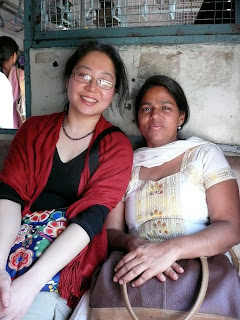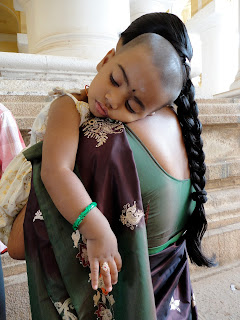My original plan had been to blog while I was there but that proved to be futile. The days were so busy and by the time I got to sleep, it was easily one or two in the morning. As it is though, I've had a lot of time to absorb my experiences and hopefully put together more thoughtful posts.
I want to introduce the main people who are a part of this organization and who I was fortunate to meet. There are others such as David from Spain and Jaques from Switzerland who are part of the project but our paths did not cross on this trip. I look forward to meeting them sometime in the future!
Walter Fischer is an acupuncturist and whose vision is the foundation of this organization. He is from Belgium and studied in Switzerland at the Swiss Institute of Chinese Medicine Guang Ming. He also spent two years studying in China in both government hospitals and private clinics.
Prior to my visit we had spoken a number of times on skype and emailed each other frequently. And every time I had a sense of Walter's integrity. But it was after working with him that I got the full breadth of his personality. I was more than pleasantly pleased to learn of his strong commitment to build clinics based on top quality care and high expectations of professionalism. Furthermore, upon learning of the quality of hygiene and cultural lifestyles of the population coupled with a very basic education provided to Indian acupuncturists, I have greatly appreciated the challenges he has had to tackle in order to maintain his high standards. Below is a video that was taken when he opened the first clinic in East Bandra slums.
 It is through the work and connections of Ujwala Patil that we were able to have the clinics in the slums. She found all the people to work with us, the assistants, the acupuncturists, the clinic space and so forth. Essentially, if it wasn't for her enthusiasm and commitment to the organization, we would have had a much more difficult time integrating into the community.
It is through the work and connections of Ujwala Patil that we were able to have the clinics in the slums. She found all the people to work with us, the assistants, the acupuncturists, the clinic space and so forth. Essentially, if it wasn't for her enthusiasm and commitment to the organization, we would have had a much more difficult time integrating into the community. Ujwala did much of the translation between the patients and I. What made her so valuable was that not only did she do the literal translation but she took the time to explain to me the customs and cultural influences. I came away with a deeper and richer understanding of these people and therefore allowing me to learn how to help more effectively. She has an immensely strong presence. Even though she is only in her 30’s I felt that the weight of responsibility, for her family and her work has given her wisdom much beyond her years.
 |
| Photo taken from the Barefoot Acupuncturists website |
She is our assistant and translator. Nothing ever seems to upset her and if anything she'll give you this look that finds the situation humorous. She makes sure that transitions between patients is smooth and often before we know it tasks are accomplished, such as mid-morning tea, ordered and arranged.
I have very fond memories of going shopping with Pooja, Ujwala and Valerie. Between train rides and motor ricksaws it took us two hours to get to the south of Mumbai where the famous Temple of Bombay looks out over the ocean. At every moment either Pooja or Ujwala was holding my hand. There were so many people, it would have been easy to be swallowed up in the second it takes to blink your eyes. With these girls, I felt very safe.
In the picture below is Meghna. She is an acupuncturist and had just joined the clinic when I had gotten there. I have a lot admiration for Meghna. I feel that she is the model of the modern day Indian woman. She has two children and extended family to care for. She has her own practice and yet still makes time for the Barefoot Clinic to volunteer. It takes her an hour and a half each way to get to the clinic and every day she comes.
I happened to cross paths with Valerie Boisson while I was there. She is a photographer and shiatsu therapist from Paris. This was her second trip to visit Barefoot Acupuncturists Clinic and she was busy volunteering her services to many patients. She is also the one to be credited for two recent videos of the clinics, one of which is in my previous blog titled "Today". It was wonderful getting to know her and furthermore, she is learning Chinese medicine. We hope that she will come and join the clinics when she finishes.
The people that I introduced above, I met during the first part of my trip. The second week I was in India, I flew to the state of Tamil Nadu and stayed in a city called Madurai. From there I was fortunate to visit the two village clinics. Muhammed Rafee who is pictured below, is an acupuncturist and my tour guide. I really was grateful to have him there as I learned a lot about the Indian people and their culture. Muhammed is in charge of finding new villages and setting up the clinics. He knows the countryside well and exudes this feeling that he is at home even in the remoteness of the regions. His grandfather was one of the first acupuncturists in India and Muhammed is very serious about carrying on his legacy.
The people in the picture below are part of the team in the Madurai clinic. Ravathay and Priya are the two ladies on the right. They are wonderful acupuncturists who are in charge of the village clinic. I loved spending time with them and in fact we were all teary eyed as we parted on the last day. They have such good hearts and their warmth is endearing. Ravathay put henna on my hands and made them look so beautiful. The other two men Ferose Khan and Yusuf Mulana are also acupuncturists who come to help out when they are able.
That is just about everybody. You will read more about them in the following posts about the individual clinics.
Cheers!


















